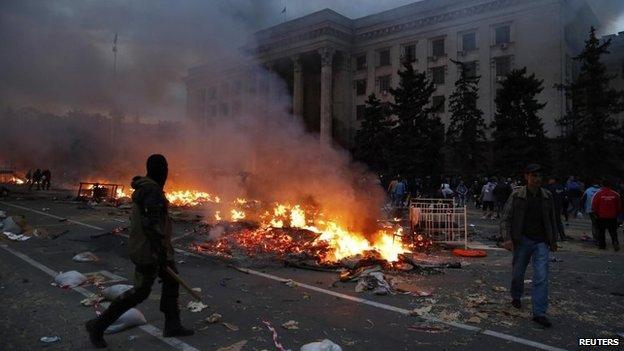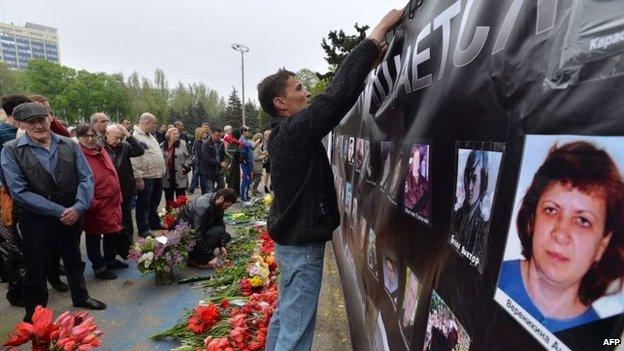Lethal divisions persist in Ukraine's Odessa
- Published
David Stern meets members of the Odessa Self-Defence Volunteers
It is a year since the southern Ukrainian port of Odessa was convulsed by violent clashes between pro and anti-government protestors, killing 48.
More than 40 of those who died were pro-Russian activists who perished in a fire in a trade union building. Investigations into what caused the blaze are still ongoing.
The tragedy created deep rifts between the pro and anti-government camps in the city, and helped fuel outrage elsewhere in Ukraine, especially in the country's east, where a separatist conflict was just beginning.
Recently, a series of bomb blasts has added to the instability. Although these have caused no injuries, the uncertainty of when and where the next one might go off has heightened anxiety.
Earlier this week, police roped off a side street in central Odessa, when an unidentified bag was discovered - only to find out it contained old clothes.
Many of the explosions struck pro-government organisations, but no-one has said they carried out the attacks. Ukrainian officials blame pro-Russian "saboteurs," however, and have made a number of arrests, external.

The fire in May 2014 was one of the deadliest episodes of the unrest that gripped the country
Strategic city
Fears have been increasing that a bigger incident could be in the works, as the city prepared for a number of public events - starting with the May Day holidays, then the anniversary of the trade union building fire and ending with ceremonies marking the end of World War Two.
Officials have significantly beefed up security: the city is full of additional law enforcement personnel and armoured vehicles. On the city limits, numerous checkpoints have been set up, where interior ministry forces in full battle gear inspect vehicles heading into town.
Pro-Kiev "self-defence" volunteer organisations have also stepped up their activities, going out on patrols by foot or car, and looking for anything or anybody "suspicious".
They say this could be as simple as a group of three young men, wearing track suits, with concealed faces.
The volunteers say that they have no doubt that pro-Russian elements are behind the bombings, in order to facilitate a takeover of the city by separatist or even Russian forces.
"Odessa is a strategic city for the Russian occupiers," said Vitaly Kozhukhar, deputy commander of one of the "self-defence" groups.
"The bombings are an attempt to destabilise the situation in the city," he adds. "An attempt to intimidate the civilian population. An attempt to show that there are people here who want Russia to come."

Activists hung a banner in front of the city's Trade Union House to remember those that died there
But some observers claim that the security crackdown has been bluntly applied, which only deepens the political rifts in the city. Odessa is a Black Sea port with a devil-may-care attitude, and the hope is widespread that the city will be able to recover from the recent violence, and overcome its divisions.
But some warn of what could happen if the divide persists.
"The best case scenario — when it will be a conflict between radicals and normal people from both sides, it will be a very big step towards peace," said Yuri Tkachev, the chief editor of the opposition news website Timer.
"The worst case scenario, is that we have a police state in Ukraine, and another worst case scenario is that we have civil war here in Odessa."